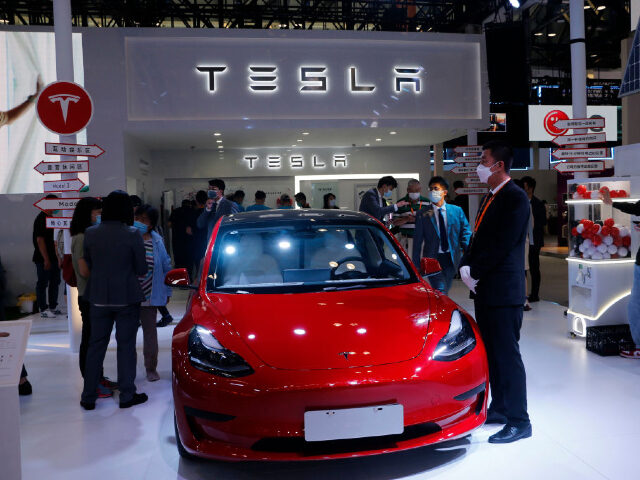China’s Ministry of Industry and Information Technology (MIIT) on Monday granted two models of Tesla electric vehicle a special exemption from a hefty vehicle purchase tax, three days after Tesla CEO Elon Musk gave a controversial interview in which he advocated China taking control of Taiwan under a “special administrative zone” arrangement similar to Hong Kong – and one day after the Chinese Communist government applauded Musk’s remarks.
The Taiwanese did not applaud Musk’s “recommendation” for China to absorb Taiwan into a “reasonably palatable” administration zone that might be a little “more lenient than Hong Kong.” As the people of Taiwan have noticed, Hong Kong’s autonomy has been ground to dust under the Chinese Communist boot ever since the 2019 pro-democracy movement was crushed.
Taiwanese politicians, from both the governing DPP party and the opposition, denounced Musk’s remarks, while the Taiwanese military announced it would stop buying Teslas. Some Taiwanese officials called for a broader Tesla boycott.
A common accusation in Taiwanese criticism of Musk was that he took Beijing’s side for selfish reasons, to curry favor with the Communist Party and protect his business interests in China. Taiwan News was therefore aghast on Thursday when it noticed China announced big tax breaks for Tesla just one day after the Chinese Foreign Ministry reversed course on its early dismissal of Musks’ comments as “inappropriate,” embracing his proposal instead.
“Provided that China’s sovereignty, security and development interests are guaranteed, after reunification Taiwan will enjoy a high degree of autonomy as a special administrative region,” said Chinese Foreign Ministry spokeswoman Mao Ning, less than 24 hours before the MIIT formally announced Tesla Model S and X cars would be exempted from the onerous vehicle purchase tax.
“The announcement indicates the two models will soon enter the China market again after a long hiatus,” Taiwan News reported with deep suspicion.
The MIIT first floated the idea of waiving the ten-percent purchase tax – which works out to over $10,000 U.S. for the expensive electric vehicles – in August 2019. At the time, the unexplained tax break was set to cover three cars, the Tesla S, X, and Model 3. The latter is a much cheaper compact car, retailing for less than half of the six-figure Models S and X.
Tesla was making a huge push for the Chinese market at the time, including the announcement of its “Gigafactory” in Shanghai, which began producing cars in December 2019 and completed a $170 million expansion in September 2022. The Gigafactory was Tesla’s first overseas production facility.
Musk lavishly praised the Chinese tyranny in 2019 for its “very thoughtful” leaders and “amazing” technological progress, a buttering-up job that industry analysts credited with persuading the Chinese government to grant its valuable tax exemption.
As Taiwan News mentioned, a “long hiatus” ensued, in which Chinese customers piled up orders for Tesla vehicles, but the status of each order languished at “pending regulatory approval.”
It was not immediately clear why final approval of the Tesla tax break took so long, precisely when the decision was made to finally grant it, or what other factors might have delayed the appearance of the Tesla Model S and X in China for so long.
Delivery of both vehicles was delayed for months – almost a year, in the case of the Model X – for what Tesla calls a “design refresh,” which is roughly equivalent to other automakers transitioning to a new model year. When production resumed, filling backorders for customers in North America were prioritized by the company, followed by Europe, and evidently now China.

COMMENTS
Please let us know if you're having issues with commenting.